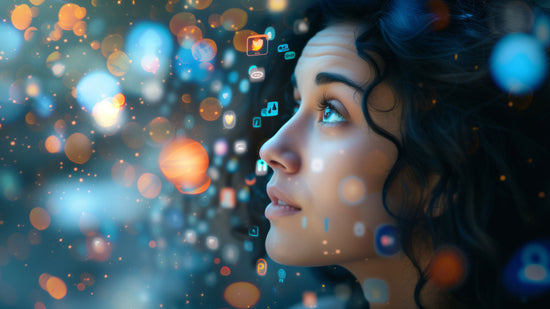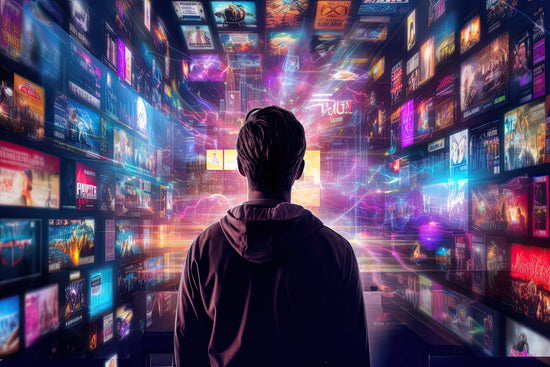A Pandemic Joyride
Our kids are home. They're bored.
And screens have filled the vacuum.
The other week I realized the reality of childhood boredom when two Texas state troopers rang my doorbell at 2 AM.
"Sir, did you give anyone permission to drive your vehicle?"
"No.” I was home, but my car was not.
Keep in mind, I live in a small town in Texas, where everyone knows your name—and your car.
In my first-ever backseat ride in a police cruiser, the troopers took me to the scene. I expected to find my car totaled and a hardened criminal handcuffed. Instead, I found a 14-year-old boy.
Turns out, he was bored. He had broken into our Techless office, stolen my 27" iMac, and swiped my car keys for a middle-of-the-night joyride.
The next morning, the police returned my recovered computer and asked me to check it for evidence. What I found shocked me...
The teen hadn't used my computer for any dubious or nefarious reasons (no crypto currencies or hacking found). Instead, I noticed he installed and played Roblox, an innocent, social game for kids.
I also found an audio recording of the teen's mother screaming at him with the most obscene phrases (I also discovered dad was out of the picture).
“The more I learned about the why behind his actions, the more my heart broke.”
Furthermore, I discovered he had taken my car for a joyride no less than THREE TIMES.
The more I learned about the why behind his actions, the more my heart broke. His intentions were not ill-willed. He left my credit card on my desk. He didn’t pawn my computer. He had messaged social media influencers selfies of himself driving my car. He was isolated, bored, and in need of control in his life—all teens need some level of autonomy.
He had expressed his loneliness and hurt in some unhealthy ways. But, as my brain was going 100 miles per hour unpacking the situation, I couldn’t help but ask:
-
How has COVID-19 affected our children and teens?
-
How is their loneliness being filled with screens instead of genuine human connection?
-
What can we do as parents, guardians, and mentors during the pandemic?
Pandemic Pains
Experts have offered insight into the pandemic's effects on our kids and teens. The research focuses on the effects of being isolated at home, disconnected from others, and more connected to screens.
Here are three big takeaways from some of the research.
1. SO CLOSE, BUT SO FAR
The Center for the Study of Traumatic Stress (CSTS) released a bulletin for families, detailing the possible side-effects of social isolation at home, including...
-
"insufficient physical activity"
-
"boredom and frustration"
-
"social isolation from peers and teachers"
-
"a lack of personal space at home" which leads to stress and "tension among family members"
We’re physically close to our family during the pandemic, but the lack of personal space and autonomy increases the emotional tension.
We’re so close, but so far.
2. "FELT LONELINESS"
Though we are stuck together, social isolation has caused loneliness for our kids and teens.
A University of Bath research team, led by clinical psychologist Dr. Maria Loades, published an analysis on this topic for the Journal of the American Academy of Child & Adolescent Psychiatry. Their findings recognized the immediate need to help our children heal from isolation.
The publication explains how "felt loneliness is associated with adverse mental health in children and adolescents.” As well, it paints a clear picture of the long term consequences if there’s no intervention to help our kids deal with loneliness.
The team concluded children are more prone to “depression and probably anxiety during and after” lockdowns and social isolation.
But, is it a guarantee for all of our children in a post-pandemic world to experience heightened negative symptoms?
Thankfully, the research notes these pandemic pains can be mitigated with "preventative support" for our kids and teens. In a related blog post, Dr. Loades addressed ways we can support our children and teens during the pandemic, including…
-
Exercising
-
Talking with others
-
Taking part in fun activities
-
“Reconnecting” with people (she emphasizes the benefits of play)
-
“Learning a new hobby”
She recognizes virtual meetings are still the norm, but she wants to see an emphasis on reconnecting kids and teens through community.
Overall, the path forward for helping our children is healthy connection and personal well-being. This means the more interconnected our kids and teens are within healthy environments, the more room there will be for healing.
In the meantime, we’re living in an unprecedented moment where social isolation is the norm. We’ve lost those play dates, birthday parties, classroom interactions, and sports competitions.
With the rise of social isolation, something has had to fill the gap.
Enter screen time, stage left.
3. OUR SCREENS HAVE FILLED THE GAP
Nellie Bowles, a columnist for the NY Times, offered an informative and humorous look into how screen time has taken over. She titled the piece appropriately: "Coronavirus Ended the Screen-Time Debate. Screens Won."
She notes how she used to "worry about" screen time as a real issue, but now she seems to have embraced the reality of screens swallowing us whole:
I have thrown off the shackles of screen-time guilt. My television is on. My computer is open. My phone is unlocked, glittering. I want to be covered in screens. If I had a virtual reality headset nearby, I would strap it on.
If this is true for adults, how has it affected our youth who now rely on screens for their education, connection, and entertainment 24/7?
Bowles quotes from Dr. Daniela Helitzer, who has kids of her own. She told the Times, "We've all officially lost the battle."
Most families have felt the reality of Dr. Helitzer's words here. Screens have rushed in to fill the gap during lockdown, eLearning, and social isolation.
In summary, the following three things have made this year a pain in the pandemic for our families:
-
Physical proximity, but emotional distance and stress.
-
Felt loneliness and its side effects.
-
The prevalence of screens filling the gap that social isolation has created.
Our Kids' Real Needs
So how does a stolen car and Roblox relate to these pandemic pains?
For now, our kids and teens lack connection, power, and freedom. As odd as it sounds, swiping my car for that midnight joyride was an exercise in control and autonomous creativity in an isolated world.

Empty playground during the pandemic. Photo by Jordan Hopkins on Unsplash
As well, he wanted community and connection. The Roblox game and the social media updates both point to his need for peer connection and affirmation.
Stealing my car and my computer—though offering a moment of freedom and digital connection—did not accomplish the teen's greater desire to be connected with other people. There’s no way stealing property, being arrested, and having to deal with the consequences fulfilled his needs for connection in the long run.
I also feel for him.
I feel for the other kids and teens stuck at home, venting their needs in unhealthy ways. I also feel for those kids who don’t say or do much right now because they are bottling up those needs inside.
Right now, our kids are hungering for genuine human connection, belonging, and playtime with their peers.
Humanizing Technology
Some final thoughts on the challenges our kids face with social isolation and screen saturation…
Sherry Turkle, an MIT professor and prominent critic of screen overuse, shared a powerful conclusion about technology during the pandemic: "It should be about learning and connecting. It should be humanizing."
At Techless, we completely agree. We are knee-deep in creating humane tech for others so they can be intentional with their screen time. We want others to experience human flourishing and face-to-face interaction.
“It should be about learning and connecting. It should be humanizing. ”
Though we depend on screens in our current situation, we will leave the constraints of social isolation behind one day (hopefully soon). This means we will have to deal with our intentional use of screens in a post-pandemic world and rebuild those lost personal connections.
Let’s start now.
We will keep bringing you the highest-quality parenting resources. Our aim: Bring back humanity to our technology, pure and simple®.
Follow us on our journey by signing up for our free newsletter.
Live fully,























